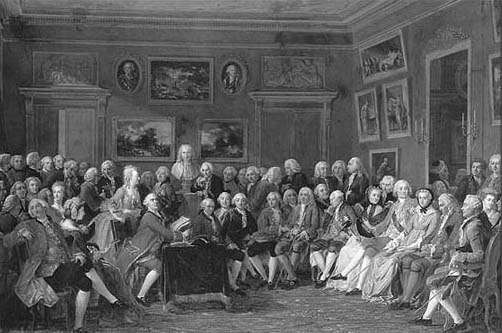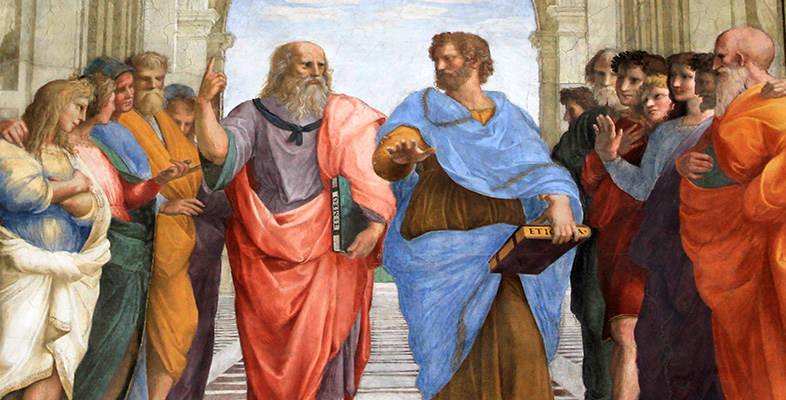2.2 The Encyclopédie
The text that best exemplifies and embodies this outlook is the French Encyclopédie, ou dictionnaire raisonne des sciences, des arts et des metiers (Encyclopédia, or an Analytical Dictionary of the Sciences, Arts and Trades), published in Paris between 1751 and 1772 in 28 volumes and accompanied by 11 volumes of illustrative plates. (Further supplementary volumes were published almost up to the French Revolution in 1789.) The main editor of the work was Denis Diderot (1713–84, pronounced Dee-der-oh), assisted in the early stages by Jean d'Alembert (1717–83). The Encyclopédie certainly took seriously its remit of collating and communicating all available knowledge in the interests of progress. The following statement from one of Diderot's many articles in the Encyclopédie, the one entitled ‘Encyclopaedia’, sets out the basic manifesto of the Enlightenment:
The aim of an Encyclopédia is to bring together the knowledge scattered over the surface of the earth, to present its overall structure to our contemporaries and to hand it on to those who will come after us, so that our children, by becoming more knowledgeable, will become more virtuous and happier; and so that we shall not die without earning the gratitude of the human race.
(Diderot, 1755, p. 635; trans. S. Clennell)
In that one brief statement we find the essence of the Enlightenment credo: that increase of knowledge will produce happier, more virtuous people. The message is one of universal application, appropriate to the entire human race. It was self-evidently better to be right than to be wrong: that is, to have a correct understanding of things, the relationship between them, and the ‘laws’ that governed those relationships. To be informed was manifestly better, more virtuous, than to be ignorant or prejudiced. Hence, as Diderot continued, all knowledge was good in itself; the discovery of truth in any field of human activity was a contribution to the advancement of human knowledge, and therefore to the advantage and ultimate happiness of humanity; the Encyclopédie, whose purpose was to spread that knowledge, was a worthy instrument of the Enlightenment. ‘Enlightenment’ itself (and its variants in other languages) signified the emergence of light and the dispersion of the clouds, particularly the clouds of ignorance, superstition, prejudice, oppression, dogma or myth. As Diderot insists later in the same article:
All things must be examined, debated, investigated, without exception and without regard for anyone's feelings … We must ride roughshod over all these ancient puerilities, overturn the barriers that reason never erected.
(Gendzier, 1967, p. 93)
Many of the authors who contributed to the work – the encyclopedists – were known as philosophes. These were not philosophers in our modern sense of the word, but a loose-knit group of like-minded intellectuals and cultivated, sociable and lively writers. Sharing a common view of the Encyclopédie and its mission, they were immensely knowledgeable in an age when it was still possible to have a good grasp of most branches of learning. Of all the encyclopedists, it was perhaps Francois Arouet de Voltaire (1694–1778) who best personified the French Enlightenment: not only in his enormous and varied literary oeuvre, ranging from neoclassical tragedy to modern history and from Newtonian science to literary criticism, but also in his passionate, energetic, highly charged and publicised commitment to Enlightenment values, a commitment which seemed to intensify as he grew older. As ‘the patriarch of Ferney’ in the 1760s and 1770s, he settled in semi-exile at Ferney, near the Swiss border; he also kept a house in Geneva as a bolt-hole in case of trouble from the French authorities. Voltaire was known throughout Europe for his active intervention in humanitarian causes and his incessant attacks on abuses of every kind, particularly abuse of power by the Catholic Church and associated miscarriages of justice. All this was given sensational coverage by his flair for publicity, his Europe-wide contacts among influential people, including crowned heads – notably Frederick the Great of Prussia and Empress Catherine the Great of Russia – and above all by his inimitable style, pointedly ironic, forceful, mischievous, malicious and funny. Voltaire never missed his target. He made the authorities, the ecclesiastical perpetrators of superstition and cruelty, smart. He made them look not merely wrongheaded, wicked and unjust, but more – he made them look ridiculous. Voltaire's style also reflects another Enlightenment characteristic: its even, moderate temper, urbane, measured and witty. Passionately as Voltaire felt about fanaticism, cruelty and injustice, his strength of feeling was the more effective for its control, the rippling, amusing surface elegance beneath which a biting wit and irony fizzed, flashed and exploded. Voltaire's best-known work, which best reflects his character and style, is his ‘philosophical tale’ Candide (1759). Here, for example, is a statement by one of its main characters, a part-Spanish valet Cacambo, about the colonial impact of the Jesuit Fathers in Paraguay (the Jesuits were a body of Catholic missionaries):
I know how the reverend fathers govern as well as I know the streets of Cadiz. It's a wonderful thing, their system of government. The kingdom is more than three hundred leagues across; it is divided into thirty provinces. The reverend fathers own everything, and the natives nothing. It is a masterpiece of reason and justice.
(Voltaire, 1981, p. 88; trans. Lentin)
This French Enlightenment tone and temper – detached, ironic and at times wickedly or darkly humorous – should be remembered when we come to discuss the very different Romantic temperament.
Although the term philosophe was French and applied mainly to thinkers from that country, it was also applied to intellectuals of any country who were sympathetic to an Enlightenment approach. Of the encyclopedists themselves, Baron d'Holbach (Paul Henri Dietrich) was a German expatriate and Jean-Jacques Rousseau (1712–78) was Swiss. ‘My dear Davy,’ Diderot wrote to the Scots philosopher David Hume (1711–76), ‘you belong to all nations … I flatter myself that I am, like you, [a] citizen of the great city of the world’ (quoted in Gay, 1968, p.13). Diderot spoke for the thoroughly cosmopolitan spirit of the Enlightenment. French was the common language of the Enlightenment, as the Berlin Academy of Arts and Sciences acknowledged in 1783 when it set an essay competition on ‘the universality of the French language’. The publications of the French philosophes were followed by an eager, albeit elite, readership across Europe. ‘I see with pleasure’, Voltaire wrote to a Russian in 1767, ‘that an immense republic of cultivated minds is being formed in Europe’ (quoted in Sorel, 1912, p. 166; trans. Lentin). There were varieties of the Enlightenment in Spain, Italy, Germany, Austria and Russia; there was a distinct and distinguished Scottish Enlightenment (of which Hume was a leading figure), and in England there were even a Midlands Enlightenment and a Manchester Enlightenment. But it was in France that the rational, reformist agenda of the Enlightenment found its most forceful expression (see Figure 3).

The philosophes saw themselves as engaged in a battle for minds; they appealed to something which they saw and cultivated as a new factor in European society: public opinion. It was with public opinion in mind that they criticised existing institutions in France and what they saw as a corrupt and ineffective absolute monarchy in alliance with a corrupt and repressive Catholic Church. While they had friends in high places who assisted the project, the Encydopédie had a stormy publication history, since its content and tone went far beyond the conventional remit of summarising and categorising knowledge. Its social and political polemic often operated through a subversive system of cross-referencing and ironic word play in an attempt to circumvent strict censorship laws, but this did not prevent several serious delays to publication of the work and determined opposition from powerful quarters.
Exercise 1
So far in this section you have been introduced to the main mission of the Enlightenment. Try now to stand back from the detail of the section, and summarise in about 50 words what you see as the main characteristics of that mission.
Discussion
The main characteristics of the Enlightenment's mission were:
- a confidence in reason or intellectual enquiry to bring greater happiness and progress to humanity;
- a belief that all aspects of the human and natural worlds are susceptible of rational explanation; and
- the desire to battle against ignorance, dogma, superstition, injustice and oppression.
How did you fare in this exercise? Did you write much more than the summary discussion set out in the discussion above? If so, it may be that you need further practice in the skill of extracting key points and summing them up concisely. You have encountered so far in this section a general exposition of the main characteristics of the Enlightenment mission, followed by some more detailed discussion of historical examples: the Encydopédie and the writings of Voltaire. This combination of main points interwoven with or succeeded by illustrative detail is commonplace in academic writing. Detail has a useful function and is essential in academic study. It both illustrates and validates general claims. But its overuse can bring the risk of obscuring the main points of an analysis: ‘not seeing the wood for the trees’. The required balance between analysis (the ordering and identification of a number of interrelated points relevant to a set question) and illustrative detail or textual evidence will vary.
Try to keep in your mind this distinction between detail and argument as you read the rest of this course. Often the main point being made will be highlighted in some way – perhaps by being stated at the opening of the section or at the beginning or climax of a paragraph, although some paragraphs (such as the paragraph above on Voltaire) will be devoted almost exclusively to the exploration or discussion of particular cases. Try to read the course so that you track the main points carefully and read through the examples more quickly. In order to help you develop this skill of prioritising your attention as you read, we have highlighted summary points in bold in each section of this course. We have also followed a procedure of including in each section the following elements, which appear in different combinations, proportions and sequences:
- a brief statement on one or more main points relating to the Enlightenment;
- some specific historical examples (including some on the introductory video); and
- some indication of the ways in which the main texts of period are located in the general ‘landscape’ of the Enlightenment.
Exercise 2
Open the Audio-Visual (AV) Notes by clicking on the 'View document' link below. After you have viewed the video (‘The Encyclopédie) and attempted the exercise relating to it in the notes, return to this course.
Video 1 'The Encyclopédie' Click within the blank screen to play video
Transcript: The Encyclopédie
Click on 'The Encyclope´die' to read the notes and exercise for video 1
The Encyclope´die [Tip: hold Ctrl and click a link to open it in a new tab. (Hide tip)]
Discussion
Summary point: the main mission of the Enlightenment was to increase human happiness and progress by the application of reason. Enlightenment thinkers used reason or intellect to fight against dogma, superstition, injustice, prejudice and oppression. They saw all areas of human enquiry as susceptible to reasoned understanding of cause and effect, ultimately expressible in terms of universal laws or principles.
